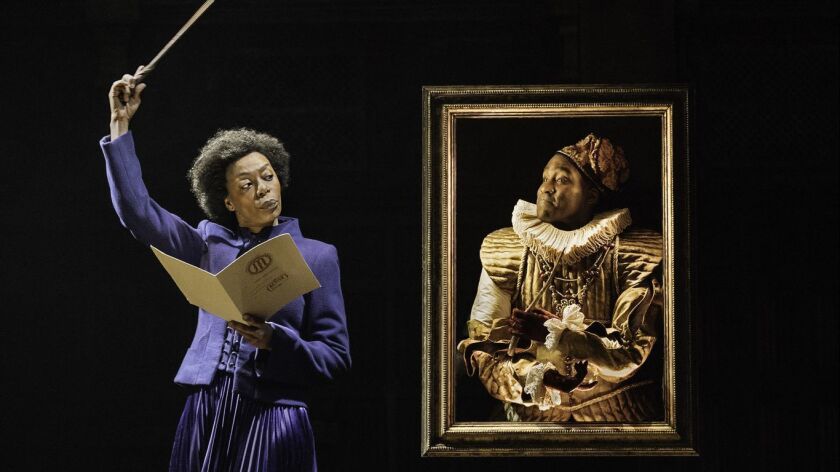
DEC. 1, 2019 3:54 PM PT
When Yanna McIntosh takes the stage Sunday for opening night at the Curran theater in San Francisco, she becomes the eighth black actress to play Hermione Granger in “Harry Potter and the Cursed Child.”
And, as was just announced, when “Harry Potter und das Verwunschene Kind” takes the stage this spring in Hamburg, Germany, Jillian Anthony will be the ninth.
The two-part theatrical event that won nine Olivier awards and six Tonys is premiering on the West Coast, launching its first non-English language production and coming to Toronto in fall 2020. And yet an important creative decision has for some reason grown into the hippogriff in the room: In “Cursed Child,” Hermione is black.
The play’s producers, Sonia Friedman Productions, declined to comment for this article, noting that the subject of Hermione’s race had been discussed at length when the play opened in London. But that was eight Hermiones ago. When asked to discuss the cultural significance of the casting decision in the era when diversity and inclusion have become priorities in theater, the producers rebuffed The Times’ attempts to speak with the show’s director, actors or anyone else in the production.
Avoiding the discussion, however, doesn’t stop fans from noticing. Some Potterheads’ heads practically exploded when they first learned that black actress Noma Dumezweni had been cast as Hermione in the original London production of “Cursed Child” in 2016. Many were elated to learn that they would finally see themselves reflected in the visage of arguably the smartest, bravest, most honorable heroine in modern literature. A smaller number of fans were incensed. Were they merely sticklers to Potter orthodoxy? Had they perceived the casting as political correctness? Or were they racists? All of the above? An online ruckus ensued.
At the time, J.K. Rowling was widely quoted as saying, “Noma was chosen because she was the best actress for the job.” But after Dumezweni, a two-time Olivier Award-winning actress, left the ensemble, all subsequent Hermiones who have been cast — from London to New York to Melbourne to San Francisco to Hamburg — have been black actors.

Early on, director John Tiffany said he wanted a diverse cast, “but that doesn’t mean I wanted Hermione to be black,” he told Scotland’s Daily Record. Half a dozen or so black Hermiones later, Tiffany was still speaking about diversity but avoiding a deeper discussion. Instead, he spoke in general terms, telling the Guardian in 2018, “I never want to drop what kind of quota of diversity we have got. I think it’s really important that we say: no, we need that number of non-white actors in this cast. But that’s not to say that I can’t do some mixing up.”
Ebony Elizabeth Thomas, author of “The Dark Fantastic: Race and the Imagination From Harry Potter to the Hunger Games,” said “this seems like a way to unofficially address concerns about diversity and inclusion in Harry Potter without officially responding to critiques.”
She speculated that the best way to protect the financial fortunes of the Potter franchise was simply not to discuss the race question publicly.
“The intellectual property is worth $25 billion, therefore it is in the best interest of all involved to keep the widest possible audience happy,” she said.
Hollywood — and Broadway — have a long, egregious track record of casting white actors as nonwhite characters. Filmdom is full of epic fails like Mickey Rooney’s Mr. Yunioshi, Natalie Woods’ Maria, and let us not forget Laurence Olivier in blackface as Othello. Given the history, the recent revelation that Julia Roberts was once considered to play Harriet Tubman hardly registered as a surprise to some.
Has blackwashing become the new whitewashing? Some are happy to see the industry make amends by casting people of color to star as beloved characters in major productions. Critics, however, worry this presto-chango switcheroo is a mere bandage that masks the persistent lack of authentically diverse characters and stories making it to stage and screen.
Currently on Broadway, Glinda in “Wicked” is black. So is Anna in “Frozen” and Hermione in “Cursed Child.” Tiny Tim is black too: The new production of “A Christmas Carol” on Broadway was adapted by Jack Thorne, who wrote “Harry Potter and the Cursed Child.” In “A Christmas Carol,” racial diversity has received less attention than disabled representation: At the insistence of Thorne, Dickens’ disabled character is played by a disabled actor.